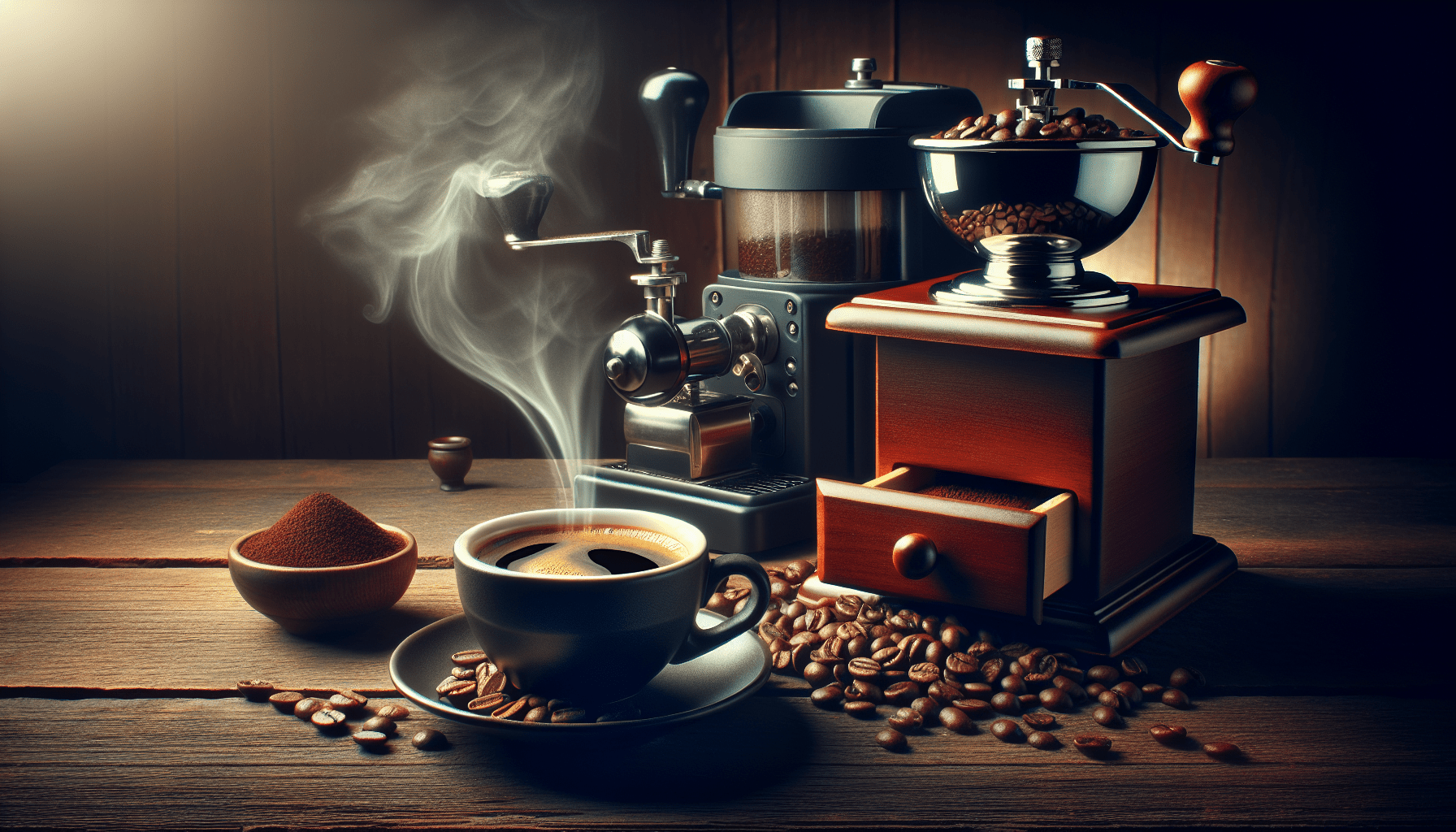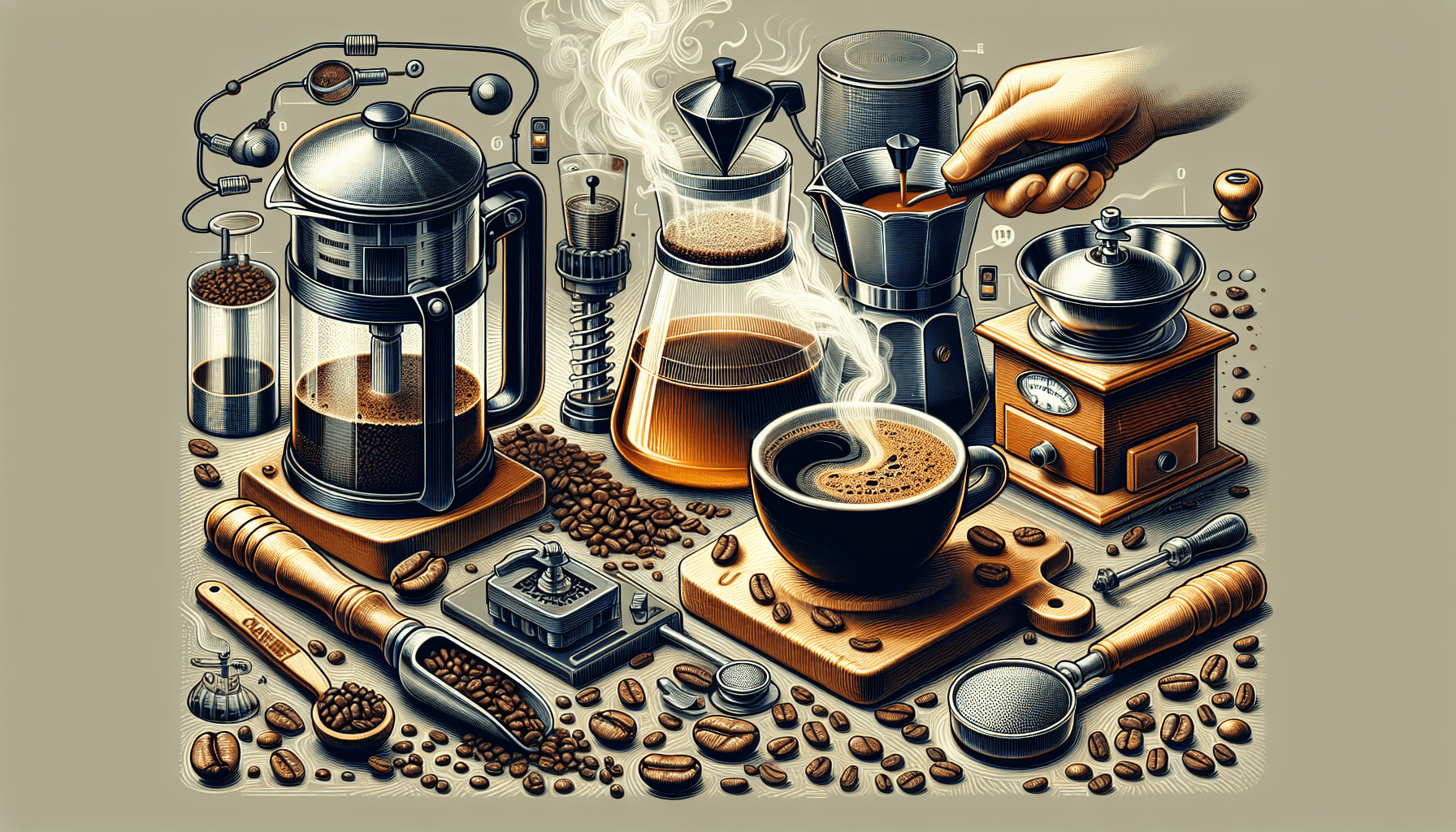If you’re a coffee lover like us, you understand the importance of a good cup of joe to start your day. But have you ever wondered if there is a difference between manual and automatic coffee makers? We’ve done the research and compiled the pros and cons of each to help you make an informed decision. From the simplicity and control of a manual coffee maker to the convenience and time-saving features of an automatic one, we’ve got you covered. So grab your favorite mug, sit back, and let’s compare the two!

Making Coffee
When it comes to making coffee, there are two main options to choose from: manual and automatic coffee makers. Each has its own advantages and characteristics that cater to different preferences and needs. In this article, we will compare the pros and cons of manual and automatic coffee makers, so you can make an informed decision on which type is best for you.
Manual: Hands-on brewing process
If you enjoy being involved in every step of the brewing process and are passionate about the art of making coffee, a manual coffee maker could be the perfect choice for you. With a manual coffee maker, you have complete control over the brewing process, from selecting the beans and grind size to adjusting the water temperature and extraction time. This level of control allows you to experiment and customize your cup of coffee according to your personal taste preferences.
Automatic: Convenient and time-saving
On the other hand, if convenience and saving time are your top priorities, an automatic coffee maker might be more suitable for your needs. Automatic coffee makers are designed to simplify the brewing process and make it effortless. With just the push of a button, you can have a freshly brewed cup of coffee in minutes, without having to worry about manually adjusting any variables. This makes automatic coffee makers a popular choice for busy individuals who want a quick and hassle-free coffee experience.
Control over Brewing Process
Manual: Customizable brewing variables
One of the key advantages of manual coffee makers is the level of control they provide over the brewing variables. From the grind size to the water temperature and extraction time, you have the freedom to fine-tune each aspect to achieve your desired flavor profile. This level of customization allows you to experiment and perfect your brewing technique to create a cup of coffee that matches your unique preferences.
Automatic: Limited control and settings
While manual coffee makers offer extensive control over the brewing process, automatic coffee makers have more limited options. They typically come with pre-programmed settings for grind size, coffee strength, and water temperature, which may not be adjustable to the same degree as a manual coffee maker. While this may be a drawback for those who prefer a more hands-on approach, it can be a benefit for those who appreciate simplicity and consistency.
Brewing Consistency
Manual: Requires skill for consistent results
One of the challenges with manual coffee makers is achieving consistent results. Since the brewing variables are manually controlled, it requires skill and practice to ensure that each cup of coffee tastes the same. Factors such as the grind size, water temperature, and pouring technique can greatly influence the end result. This means that it may take some time and experimentation to master the art of manual brewing and consistently produce the same high-quality cup of coffee.
Automatic: Consistent results with programmed settings
With automatic coffee makers, consistency is one of their strong suits. Since the brewing variables are pre-programmed, you can expect the same results with each brew. This is particularly advantageous for those who prefer their coffee to taste the same every time, without the need for manual adjustments. Automatic coffee makers are designed to deliver a consistent cup of coffee, allowing you to rely on the machine to produce the desired flavor every day.
Brewing Time
Manual: Longer brewing time
If you enjoy the process of brewing coffee and have the time to spare, manual coffee makers can provide a more leisurely experience. However, it’s important to note that manual brewing methods generally take longer than their automatic counterparts. From grinding the beans to heating the water and the actual brewing process, each step requires time and attention. This slower pace can be appreciated by coffee enthusiasts who savor the ritual of making coffee and enjoy the anticipation of a meticulously brewed cup.
Automatic: Faster brewing process
If time is of the essence and you need your coffee quickly, automatic coffee makers are the way to go. With their fast brewing process, you can have a cup of coffee ready within minutes. This can be especially beneficial for busy mornings or when you need a quick caffeine boost before heading out the door. Automatic coffee makers are designed for efficiency and convenience, allowing you to enjoy your coffee without any unnecessary delays.

Grind Consistency
Manual: Allows for manual control over grind size
The grind size of coffee beans plays a crucial role in the overall flavor and extraction process. Manual coffee makers often provide the option to manually control the grind size, allowing you to adjust it according to your preferred brewing method and taste. This level of control ensures that you can achieve the perfect grind consistency for your chosen brewing technique, whether it’s a fine grind for espresso or a coarser grind for a French press.
Automatic: Relies on built-in grinder for consistency
Automatic coffee makers typically come equipped with a built-in grinder, ensuring a consistent grind size with each brew. This eliminates the need for manual grinding and ensures that the coffee grounds are uniformly sized for optimal extraction. While this convenience can be a time-saver, it also means that you have less control over the grind size. If you prefer to have complete control over this aspect, a manual coffee grinder may be a better choice for you.
Ease of Use
Manual: Requires more manual effort and technique
When it comes to ease of use, manual coffee makers require more manual effort and technique compared to their automatic counterparts. With manual brewing methods like pour-over or French press, you need to carefully measure the water and coffee ratio, time your pour, and follow specific steps to ensure a proper extraction. While this hands-on approach can be enjoyable for coffee enthusiasts, it may be considered an inconvenience for those who prefer a more straightforward and simple brewing process.
Automatic: User-friendly with push-button operation
In terms of user-friendliness, automatic coffee makers excel. With their push-button operation and pre-programmed settings, brewing a cup of coffee is as easy as pressing a button. There is no need to measure or time anything, as the machine takes care of all the details. This makes automatic coffee makers a convenient choice for those who want to enjoy a cup of coffee without the need for any manual effort or complex instructions.
Cost
Manual: Generally more affordable
When it comes to cost, manual coffee makers are generally more affordable than their automatic counterparts. Manual brewing methods like pour-over, French press, or AeroPress require minimal equipment and do not rely on electricity, making them budget-friendly options. Additionally, manual coffee makers do not require regular maintenance or replacement of complex components, further reducing long-term costs. If you’re on a tight budget or looking for a cost-effective way to enjoy high-quality coffee, a manual coffee maker might be the ideal choice.
Automatic: Often more expensive
In contrast, automatic coffee makers tend to be more expensive upfront. The cost of an automatic coffee maker can vary depending on the brand, features, and build quality. Automatic coffee makers come with built-in grinders, timers, and other advanced features, which contribute to their higher price point. Moreover, the convenience they offer and their complex mechanisms may require occasional repairs or replacement parts, adding to the long-term cost. If convenience and the latest technology are worth the investment to you, an automatic coffee maker may be the way to go.
Maintenance
Manual: Easy to clean and maintain
Maintenance is an important factor to consider when choosing a coffee maker. Manual coffee makers are generally easy to clean and maintain. With most manual brewing methods, all you need to do is rinse the equipment after each use and occasionally give it a more thorough cleaning. Since manual coffee makers do not have many complex components or electronic parts, there is less risk of malfunction or breakdown over time. This simplicity makes manual coffee makers a hassle-free and low-maintenance option.
Automatic: Requires regular cleaning and descaling
Automatic coffee makers, on the other hand, require regular cleaning and descaling to ensure optimal performance and prevent any build-up of coffee residue or mineral deposits. While some automatic coffee makers come with self-cleaning functions or easy-to-remove parts, it is still important to dedicate time to regular maintenance. From cleaning the brew basket to descaling the internal components, these steps are necessary to maintain the longevity and functionality of an automatic coffee maker. If you are willing to commit to regular cleaning and maintenance, an automatic coffee maker can provide you with a long-lasting brewing solution.
Portability
Manual: Lightweight and portable
If you frequently travel or enjoy brewing coffee on-the-go, manual coffee makers are a convenient choice. Manual brewing methods like AeroPress or pour-over are lightweight and easily portable. They do not rely on electricity, making them suitable for camping trips, road trips, or any situation where you don’t have access to a power source. Manual coffee makers allow you to enjoy the same high-quality coffee anywhere, anytime.
Automatic: Bulky and less portable
In comparison, automatic coffee makers are generally bulkier and less portable. They are designed for use in a fixed location, such as a kitchen or office, and require a power source to operate. The larger size and reliance on electricity can make automatic coffee makers less suitable for travel or outdoor activities. If portability is important to you, a manual coffee maker is the more practical option.
Additional Features
Manual: Limited features, focuses on simplicity
When it comes to additional features, manual coffee makers tend to be more simplistic and straightforward. The focus is on the brewing process itself, allowing you to fully immerse yourself in the art of coffee making. Manual coffee makers do not come with the bells and whistles of automatic machines, but they are appreciated for their simplicity and the opportunity they provide to perfect your brewing technique.
Automatic: Many programmable features and options
On the other hand, automatic coffee makers are packed with programmable features and options. From adjustable brew strength and temperature to pre-set timers and auto shut-off functions, automatic coffee makers offer a range of customization options to cater to individual preferences. These additional features enhance convenience and allow you to personalize your coffee experience further. If you enjoy the convenience of technology and having control over various brewing settings, an automatic coffee maker might be your ideal choice.
In conclusion, both manual and automatic coffee makers have their pros and cons. The decision ultimately comes down to personal preference, lifestyle, and priorities. Manual coffee makers give you complete control over the brewing process, allowing you to customize each cup of coffee according to your taste preferences. They are often more affordable, easy to maintain, and provide a more hands-on brewing experience. On the other hand, automatic coffee makers offer convenience, speed, consistency, and a wide range of programmable features. They may come with a heftier price tag and require regular maintenance, but they are perfect for those who prioritize ease of use and time-saving qualities.
Consider your preferences, brewing routine, budget, and lifestyle when deciding on the best type of coffee maker for you. Whether you choose the delightful ritual of manual brewing or the convenience of automation, both options can bring you the joy of a perfectly brewed cup of coffee.
